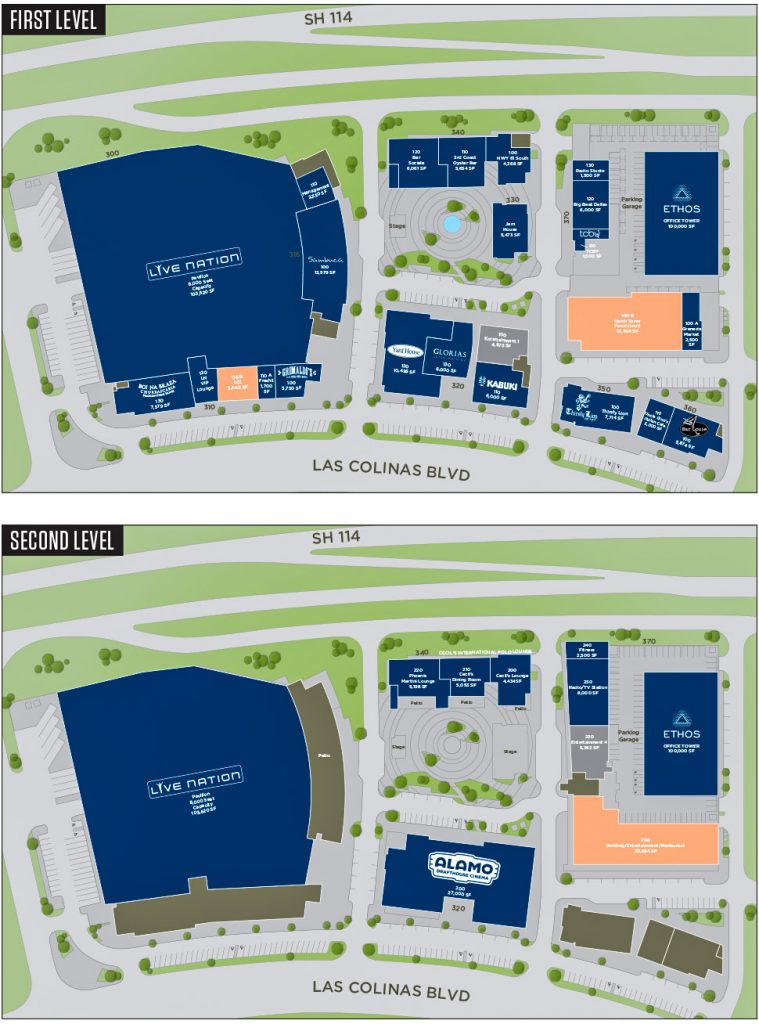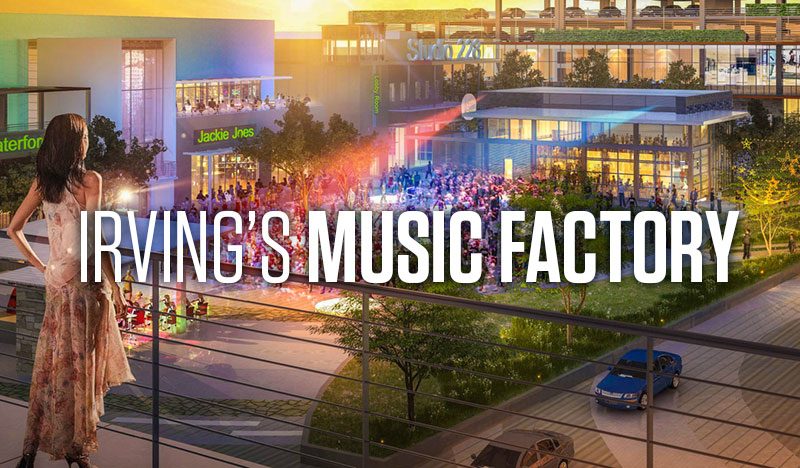The city of Irving and the Music Factory developer are in harmony again
A brisk wind kicks up dust at the massive plot of land near the Irving Convention Center in Las Colinas where four cranes tower above a stark cement building boldly rising 70 feet into the air.
Despite the grit and grind of construction, there’s a “cool” factor already present.
The building, to be called the Pavilion, will house the cornerstone concert venue at The Music Factory — a 17-acre entertainment district that has been a decade in the making. The development is scheduled to open in summer 2017.
With the Pavilion as the centerpiece, The Music Factory will radiate outward with some 25 restaurants and bars, an eight-screen Alamo Drafthouse Cinema for moviegoers, an office building, a parking garage and walkways connecting it all to a Westin Hotel and the Irving Convention Center.
“Irving is a city built for business,” says Beth Bowman, president and CEO of the Greater Irving-Las Colinas Chamber of Commerce. “But we’ve had leakage in that lifestyle-visit-play piece.”
The Music Factory, city and chamber officials believe, will position the city to offer Irving residents, visitors, employers and employees outstanding choices for shopping, dining, and entertainment.
The best-in-class project could help woo businesses that are thinking about relocating or expanding in Irving while enticing those already in the city to stay, Bowman says.
“When the Music Factory comes online, what we get to say to the businesses that we have lost because we didn’t have entertainment options is — now we do,” Bowman says.
Maura Gast, executive director of the Irving Convention & Visitors Bureau, says The Music Factory will also help put heads in beds. The CVB should be able to attract a wider variety of conventions, including those that may have declined to book the center previously because of the lack of entertainment options.
NEW JOBS AND ECONOMIC VITALITY
Scott Connell, the city’s economic development director, says The Music Factory will bring 1,500 direct jobs to Irving and about $14 million in local sales tax revenue for the city over a 10-year period.
Because the entertainment district is in the city’s urban core, it won’t just benefit local residents but should create a live-work-play environment for the city’s Las Colinas employment center where about 90,000 people come each day to work.
“We have a great office environment but we are underserved in restaurants, and we are underserved in after-hours opportunities. Our employers are telling us that that they want to be able to attract the best and brightest employees, and they are looking for these types of amenities,” Connell says. “It’s important that we create this holistic environment.”
BRINGING IT ALL TOGETHER
A deal this big doesn’t come together overnight. This project took years, starting in 2007 when Irving residents voted to spend city funds to build a convention center and to help fund an adjacent entertainment district.
The project stalled in 2012 when the city broke ties with the first developer, Billy Bob Barnett and Las Colinas Group. A lawsuit filed by Las Colinas Group that alleged breach of contract risked torpedoing the project altogether.
That’s about the time that North Carolina-based ARK Group stepped in. The ARK Group was tracking the project and saw a potential opportunity, says ARK Group President Noah Lazes, who visited Las Colinas after the project stalled.
“To us, the most interesting thing about the market is that you have 29 million square feet of office space and 12,500 hotel rooms,” he says.
All of that office space translated into a huge demand for restaurants, retail and entertainment that wasn’t being met, he says.
“We are not typically retail developers, we are entertainment developers,” he says. As such, ARK was already confident that an entertainment district with 20 or so restaurants, a movie theater, and a concert venue would be successful in any city on the weekends.
“The problem is what do you do on Monday through Thursday? How are you going to make money? That’s always the problem in an entertainment deal.”
But in Irving, that won’t be an issue, he says.
“You have a massive weekday population that is coming in from all over the world and filling hotel rooms and visiting that 29 million square feet of office,” Lazes says. “It’s a beautiful base and makes a truly well-rounded seven-day-a-week venture. That is what excited us about the market.”
Indeed, restaurant space at The Music Factory leased quickly. The food and beverage portion of the project, with nearly 25 spaces for lease, is nearly 100 percent leased, he says. The Ethos Group, meanwhile, will take the entire 100,000 square feet of office space.
Like the developer before them, ARK also had some issues getting the project moving. It stalled after the developer’s lender raised concerns about earthquakes in Irving. When ARK asked for changes in the city’s agreement to appease the lender, the city balked and relationships soured.
ARK Group stopped construction temporarily and brought in a new lender and both sides eventually resolved their issues.
Goodwill returned, and the project has moved forward.
BRINGING THE PRJECT TO LIFE
Gensler, the design architect and architect of record, said the firm worked closely with the city of Irving and the Las Colinas Association to come up with a design that fit in well with the surroundings.
“Las Colinas is a corporate, sophisticated, mild-mannered environment,” Gensler Principal Barry Hand says.
“To go in with a message-heavy entertainment district is quite a turn from the original conception for Las Colinas,” Hand says. “The design (of The Music Factory) is very graphic. In an entertainment district, there are marquee signs, video boards — to have the ability to do that required us to work with the city and the Las Colinas Association.”
Both the city and the association, which oversees signage and other standards in Las Colinas, worked closely with Gensler to come up with agreeable design standards, says Ross Conway, Gensler design director for The Music Factory.
“I want to compliment them because they were very open minded and willing to work with us on what will be a catalyst on the northern end of Las Colinas,” Conway says.
The entertainment district’s design is far different from the corporate office buildings of Las Colinas. Its buildings are component driven and support advertising and brand statements from the tenants, he says.
They also have visual texture and patterns making them stand out from the more button-downed corporate persona found in Las Colinas.
The landscape design works in a musical theme, but also fits in with the character of Las Colinas, says Bill Millsap, partner with landscape architect Studio Outside.
The outer road, for example, uses geometric designs with lots of repetition of trees and paving patterns to fit in with the business district, and the landscaping also forms an aesthetic link between the convention center, the Westin hotel and The Music Factory.
Interior landscaping will use paving patterns that resemble sounds waves using different textures and materials, he says. Studio Outside Landscape Architects incorporated lyrics from famous songs of many different genres — sandblasting them into the paving patterns.
“You can actually walk and remember songs,” he says. “You can read these words and they recall the history of music.”

TIMELINE
The Music Factory has been in the making for a decade. Here’s a look at why it’s taken so long to write this song:
- 2007: City of Irving residents vote to help fund an entertainment venue and convention center to replace revenue from the Dallas Cowboys’ planned move to Arlington.
- July 2008: Irving partners with Las Colinas Group, and its affiliate, Billy Bob Barnett of Billy Bob’s honky-tonk, to jointly develop a $252 million-dollar entertainment venue.
- 2010: The city hires an accounting firm to audit payments to Las Colinas Group.
- August 2012: City of Irving pulls out of the deal.
- August 2012: Las Colinas Group sues the city in $139 million breach of contract lawsuit.
- July 2013: City hires new developer, ARK Group, for a smaller project at the site. ARK promises to pay the former developer to drop its lawsuit.
- August 2013: A judge dismisses the lawsuit after a settlement is reached for ARK Group to buy out Las Colinas Group’s interest.
- August 2014: Alamo Drafthouse announces it will open a venue at The Music Factory.
- August 30, 2014: Groundbreaking occurs.
- December 2014: Live Nation announces it will be the exclusive operator of the concert venue.
- May 2015: Construction stops as ARK Group seeks contract adjustments to address earthquake risks.
- September 2015: City Council votes against the project 5-4 after ARK and the city fail to agree on contract amendments.
- September 2015: The contract gets tweaked and unanimously approved.
- March 2016: The Ethos Group leases the entire office portion of the project, 100,000 square feet.
- September 2016: ARK Group seeks private financing.
- February 2016: Second groundbreaking occurs.
- Summer 2017: Expected completion of $173 million entertainment venue.

